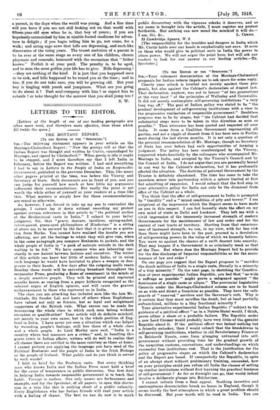LETTERS TO THE EDITOR.
[Letters of the length of one of our leading paragraphs are often more read, and therefore more effective, than those which fill treble the space.]
THE MONTAGTJ REPORT.
[To THE EDITOR OF THE " SPECTATOR."] Sre,—The following statement appears in your article on the Montagu-Chelmsford Report : "Now the gossips tell us that the Indian Report was thought and written by Curtis, camouflaged by Montagu, and signed by Chelmsford." When gossip is idle it ought to be stopped, and I must therefore say that I left India in -February, before the Report was written. I had said everything I had to say in Letters to the People of India on Responsible Government, published in the.previous December. This, like many other papers printed at the time, was before the Viceroy and Secretary of State. Both documents are in front of you, and you can judge for yourself how much or how little my arguments influenced their recommendations. But really the point is not worth the while either of yourself or your readers at a time like this. What matters is simply how far those recommendations are sound or otherwise.
As, however, I am forced to take up my pen to contradict the gossips, I cannot lay it down without recording my protest against certain references in this article to "the .political section of the Brahminical caste in India." I submit to your better judgment, Sir, that "grave, demure, insidious, spring-nailed, velvet-pawed, green-eyed philosophers of Hindostan" is a string of abuse not to be excused by the fact that it is given as a quota- tion from Burke. You cannot have realized the insults you are inflicting, nor yet the feelings to which they will give rise, when in the same paragraph.you compare Brahmins to jackals, and the whole people of India to "a pack of animals outside in the dark waiting to be fed." We have -enemies who are labouring con- stantly to sow hatred between Indians and ourselves. The writer of this article can know but little of modern India, or in using such language he would have hesitated to place a weapon so dan- gerous in their hands. A few days after the outgoing mails reach Bombay these words will be spreading broadcast throughout the vernacular Press, producing a tame of resentment in the minds of a deeply sensitive people. They will be printed and reprinted months. hence, as coming from a paper hitherto recognized as the soberest organ of English opinion, and will cause the gravest embarrassment to those who represent us in India.
The class you are attacking has included men like the late Mr. Gokhale, Sir Sunder Lal, and hosts of others whom Englishmen have valued not only as friends, but as loyal and enlightened supporters of the British rule. What excuse can be made for denouncing the -whole class to which such men belong without exception or qualification? Your article will do definite mischief, not merely to your own cause, but to the whole position of Eng- land in India. I have never yet seen a situation which was helped by wounding people's feelings, still less those of a whole class and a whole people. As Lord Morley once said, "India is a country where bad manners are a crime," and, in handling this grave crisis in Indian affairs, writers will do well to realize that all classes there are entitled to the same courtesy as those at home. I cannot picture you applying the language you have used of the Political Brahmins and the people of India to the Irish Bishops or the people of Ireland. What public end do you think is served by such words?
I hold no brief for the Brahmin caste. But every thinking man who knows India and the Indian Press must hold a brief for the cause of temperance in public discussion. Our first duty in helping India towards responsible government is to teach that habit. Precept is useless. Our only means are forbearance and example, and for the Spectator, of all papers, to open this discus- sion in a vein like this is nothing short of a public calamity. Every Englishman who has Indian friends will read your article with a feeling of shame. The best we can do now is to mark public discourtesy with the vigorous rebuke it deserves,. and as my name is brought into the article, I must register my protest forthwith. But nothing can now mend the mischief it will do.—
[The responsibility for the troublesund dangers in India which Mr. Curtis holds over our heads is emphatically not ours. It,rests on those who would give to political sects in India the power to abuse power. We will not argue the point here, but will ask our readers to look for our answer in our leading articles.---En. Spectator.]


























 Previous page
Previous page